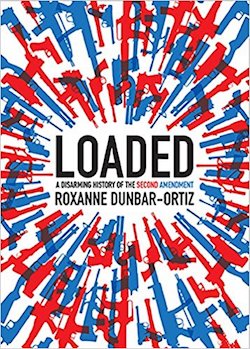Loaded words
At the beginning of last night's edition of the Reading Through It Book Club, I was pretty high on Roxanne Dunbar-Ortiz's Loaded: A Disarming History of the Second Amendment. The way that Dunbar-Ortiz framed America's love affair with guns as an extension of the nation's history of colonialism and racism made a lot of sense to me.

Others in the book club were not as high on the book as I was. One member said Loaded had too many typos and unsubstantiated claims to take seriously. Another refuted a few of the book's historical facts, and argued that a few historical interpretations — particularly behind the motivation of the Virginia Tech shooting — were borderline irresponsible. Many others landed somewhere in the middle. "I didn't not like it," someone said.
But even those who disagreed with Dunbar-Ortiz's methodology agreed with many of her conclusions. Gun culture in the US simply is different than everywhere else, and it's really remarkable how many of the institutions we simply assumed always existed are fairly new inventions. (The concept of a police force, for instance, is much newer than most people think.)
So with that common ground found, how do you dismantle a culture that is hard-wired into America's original sins? Despite Dunbar-Ortiz's worthy efforts to get to the bottom of the word "militia," you can't get anywhere by nitpicking the Second Amendment in hope of finding some wisdom in the words of the Founding Fathers. Nobody will ever win a fight by getting to the true meaning of the Bill of Rights.
Instead, it's better to find common ground, and to rework your messaging until it appeals to a majority of people. Stop referring to "gun control," for instance, and start talking about "gun safety" or "gun responsibility" or "ending gun violence." Talk about the public health costs that guns exact on America, the way that we now talk about the health risk of cigarettes, or the risks of impaired driving. Make the conversation about sensibility and security, rather than morality and shame.
It feels hopeless every time some white man with an abusive past and a history of racist behavior picks up a weapon of war and exacts his will on the world. But if you look around, you'll see that progress is being made. This fall, people who live in Washington state will be able to vote for Initiative 1639, which creates safer schools and communities. (If you're looking for something to do in the battle against gun violence, please consider donating money or, more importantly, your time to passing this important initiative.) We're having different conversations now than we were ten years ago. Things are getting better.
The trick is always refining the conversation, being more accurate with your words, and being clear about what you want and what you see in the world around you. Even book club members who were skeptical about Loaded admit that they might have liked the book better if it were labeled "A Polemical History." The work that words do is invisible most of the time, but this is the work that defines our world, and everything in it.
The next Reading Through It Book Club meets at Third Place Books Seward Park at 7 pm on Thursday, July 5th. We'll be discussing David Grann's Killers of the Flower Moon: The Osage Murders and the Birth of the FBI.